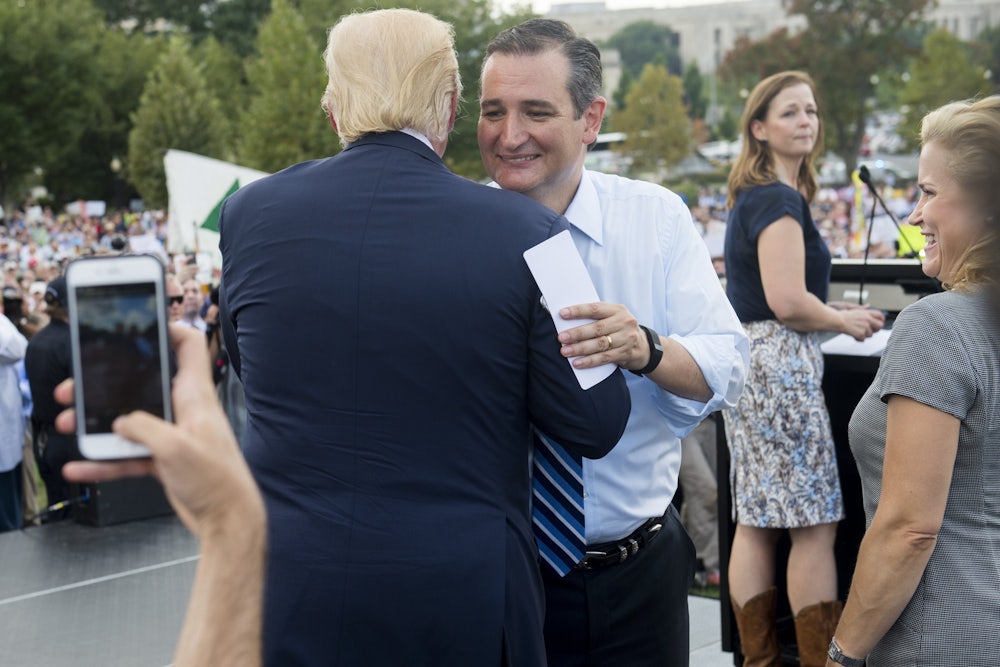When the Republican candidates convene Tuesday in Las Vegas for the next primary debate, Donald Trump will be flanked for the first time by Ted Cruz, who now polls in second place nationally and first in multiple Iowa surveys. If CNN used any of the major polling aggregators to determine stage placement, he’d be flanked on the other side by Marco Rubio, rather than Ben Carson, whose support continues to plummet.
These developments carry a great deal more than symbolic significance. They should force the political world to rethink its conception of the campaign altogether. Rubio has made the center-stage cut before, but Carson’s rapid descent hasn’t just benefited Trump. It has also allowed Cruz to break out of the welter of dark horses polling near or under five percent and rise into second place.
For the first time Tuesday, we will see the three emerging finalists congregating near center stage, and with perhaps the exception of Rubio, they are not who most people thought they’d be a year ago, or even a few months ago, when Trump first established dominance.
The early conventional wisdom held that the 2016 primary would be in many ways a replay of 2008 and 2012, with a divided field of conservatives unable to consolidate behind a single counterweight to an establishment-favored candidate. Jeb Bush was supposed to be that guy. Those who doubted Bush had the right chops or background or policy mix to unite the party placed their bets on different candidates like Rubio or early dropouts Rick Perry and Scott Walker. But the underlying analysis was the same.
Trump’s emergence at first changed little. Many assumed he was a flash-in-the-pan candidate who, once vanquished, would leave the standard model of Republican primaries well intact. But even those who saw Trump as more than a passing phenomenon still believed that the establishment would coalesce behind a single alternative to defeat him. When Bush continued to disappoint, Rubio became the alternative, both by default (nobody else was popular enough) and because he proved more adept at straddling elite and grassroots factions than Bush did. Bush came to represent the former, Trump the latter, and Rubio the uniting figure who could appeal to both.
By adopting ever more reactionary views and moving the party consensus on national security and immigration to the right, Trump has spoiled that calculus as well. Rubio—once the goldilocks candidate of both the right and the establishment—is quickly becoming another Bush. (That Rubio’s agenda so neatly reprises the George W. Bush agenda reinforces this perception.) Cruz—one of the least uniting figures in Republican officialdom—is meanwhile emerging as the candidate who can best straddle the poles of GOP politics.
This is a crucial development on its own, but especially if you’re of the view that something will intervene to end the Trump juggernaut. If, before the Carson bubble burst, you were convinced the Republicans would nominate a candidate who tiptoed around Trump rather than confront his heresies (and thus that Rubio stood a better chance of winning than Bush), you must now replace Bush with Rubio, and Rubio with Cruz, in your analysis.
After Trump proposed freezing Muslim immigrants out of the U.S., Rubio finally cracked.
The next President better be somebody who can unite our country to face the great challenges of the 21st Century.
— Marco Rubio (@marcorubio) December 8, 2015If you believe Trump’s robust lead both nationally and in every early primary state suggests he can actually win the nomination, none of this matters. But if you believe he will ultimately fade and his send his supporters defecting to the next-best thing, then Cruz is the guy to watch—both on the debate stage Tuesday and as the debates give way to actual statewide contests just over a month from now.
